Israeli Foreign Minister To Visit Turkey Amid Heightened Iranian Threats
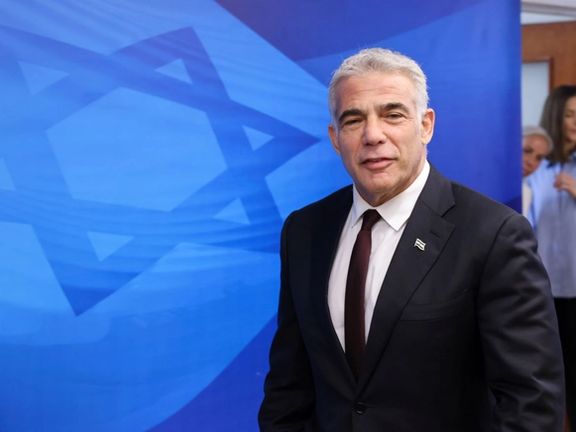
Israeli Foreign Minister Yair Lapid will visit Turkey this week amid worries over growing threat of attacks against Israeli citizens by Iranian agents.

Israeli Foreign Minister Yair Lapid will visit Turkey this week amid worries over growing threat of attacks against Israeli citizens by Iranian agents.
Lapid office announced the snap visit on Sunday after months of warming ties between Israel and Turkey, adding that he would meet with Turkish counterpart Mevlut Cavusoglu, who last month visited Israel.
Israeli officials and media began issuing the warnings in the end of May, citing suspected assassination or abduction plots by Iran, which has vowed to avenge the May 22 assassination of a Revolutionary Guards colonel in Tehran that it blamed on Israeli agents.
Earlier in the day, Israeli President Isaac Herzog thanked Turkish President Recep Tayyip Erdoğan for “efforts to thwart (Iran’s) terrorist attacks against Israelis,” adding that “the threat has not yet passed and that the counterterror efforts must continue.”
On Saturday, Defense Minister Benny Gantz issued a statement reiterating that there is a serious risk of attacks on Israelis in Turkey by Iranian networks.
Despite repeated statements from Israeli officials warning of impending Iranian attacks, Tehran has generally remained silent, but on Saturday, the Iranian and Turkish foreign ministers had their first phone call since the warnings.
Iranian state media said Cavusoglu has invited his Iranian counterpart Hossein Amir-Abdollahian to visit Turkey, without providing any time for the visit.
Ankara has reportedly warned the Islamic Republic against attacking Israelis in Turkey, saying it is not prepared to allow Iran to use its territory to carry out acts of terrorism against other nations.
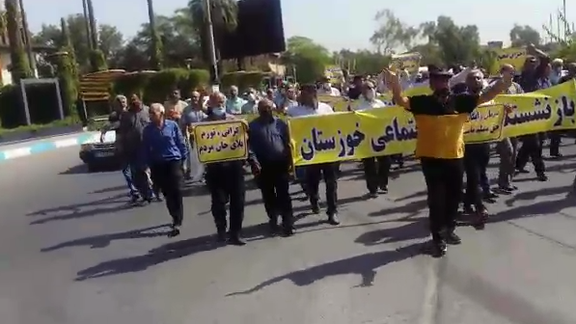
As strikes and protests continued in Iran’s retail and industrial sectorss on Sunday, a group of workers of Tehran’s transportation fleet held a protest rally for their demands.
The drivers and truckers gathered in front of the Roads and Transportation Organization in Tehran to protest the economic hardship they are going through.
Videos on social media showed them chanting slogans against the empty promises by the government and the crackdown by the security forces.
In May, the Union of Truckers and Drivers' Organization announced plans to hold a nationwide strike, saying holding protests for the realization of their demands are their inalienable right. The date of the strike is to be announced soon.
Sunday’s protest took place against the backdrop of shop owners’ strikes and pensioners' protests in many cities across the country, such as Kermanshah, Sari, Rasht, and several cities in the oil-rich Khuzestan province, including Ahvaz, Shush, and Shushtar.
The protests and strikes by pensioners and retailers on Saturday coincided with President Ebrahim Raisi’s first election anniversary amid economic and political uncertainty.
Retirees took to the streets in many cities and towns on Sunday again to protest the meager rise in their pensions, which fails to compensate for the huge drop in their purchasing power given an inflation rate of over 40 percent. The current round of strikes and demonstrations began on Sunday, June 12, after Iran’s currency fell to a historic low of 333,000 rials to the US dollar.
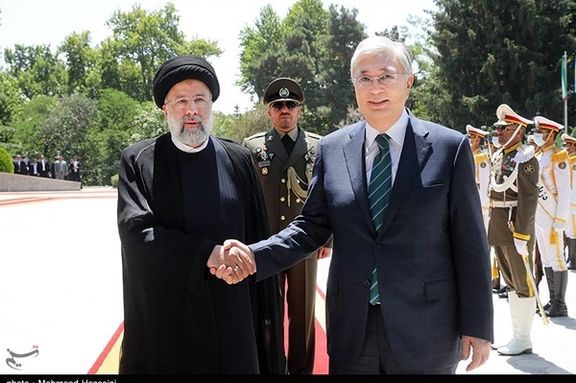
Kazakhstan's president arrived in Iran June 19 at the head of a high-ranking delegation to hold talks with his counterpart Ebrahim Raisi on issues of mutual interest.
Kassym-Jomart Tokayev, who came to Iran at the invitation of his Iranian counterpart, was welcomed by Raisi at Saad Abad palace on Sunday, which follows several other foreign visits to Tehran in recent weeks in a what could be a determined effort to show that the Islamic |Republic is not isolated internationally.
Iran’s state media said that officials from the two countries signed nine Memoranda of Understanding (MoUs) on transit and transportation, scientific and cultural exchanges, agriculture and other fields in a session overseen by the presidents.
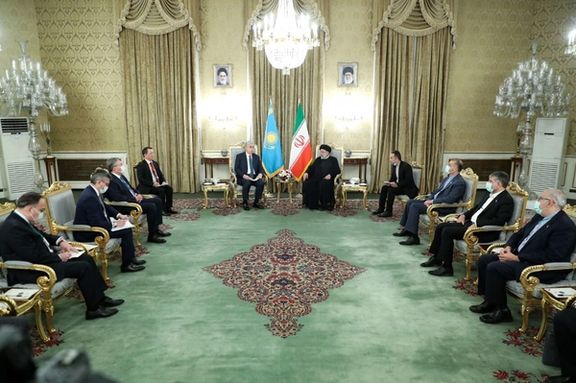
Speaking in a joint press conference with his Kazakh counterpart after the signing ceremony, Raisi claimed bilateral trade ties have increased in recent months, adding that the volume of transactions should reach $3 billion, which sounds far-fetched given the current figure of about $265 million according to the country’s customs administration.
Just recently, Raisi welcomed Turkmenistan’s new President Serdar Berdimuhamedow and signed documents for bilateral economic cooperation, and a day earlier, Pakistani Foreign Minister Bilawal Bhutto Zardari was in Iran to bolster ties.
The Raisi administration has promulgated once and again that its foreign policy is focused on expanding relations with neighbors, a policy hailed by the Supreme Leader.
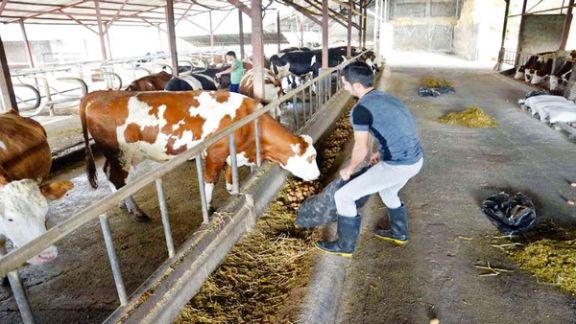
A sixfold rise in animal feed prices in Iran has brought about a wave of bankruptcy among cattle breeders, forcing them to sell their starving or half-dead cows at lower prices to slaughterhouses.
According to a report by Shargh Daily on Sunday, there are long queues of cattle at slaughterhouses as the supply is high and demand low due to the dire economic situation in the country.
The chairman of the Livestock Supply Council, Mansour Purian, said the livestock have become weak and lost a lot of weight, adding that such cheap cattle have a lot of customers in the Arab countries, so smugglers sell these half-dead cows to them to be fed on their equipped farms.
On the other hand, low purchasing power by Iranians has drastically reduced the demand for meat by as much as 50 percent in the past year, which has caused many small farmers to be eliminated from the supply chain.
Criticizing the government’s decision to increase livestock feed prices, Nasser Ostad-Ahmadi, the managing director of one of Iran’s largest farmers' cooperatives, told the daily that “in the history of Iranian animal husbandry, both before and after the revolution, it had never been seen that the government increases the price of a commodity sixfold overnight.
Soybean meal, barley and corn for livestock and chicken feed are mainly imported from Russia and other countries. Any shortages or higher prices can push up the price of meat further.
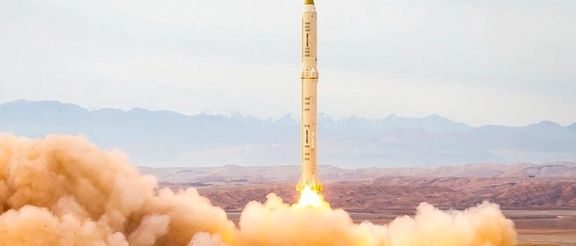
A hardliner newspaper in Iran has called for a “formidable blow” against Israel inside its territories, for Israeli operation in Iran and to restore Tehran’s credibility in the region.
In its Sunday issue, Resalat, a publication that belongs to Iran’s traditional conservatives with no direct link with military hardliners, has argued that repeated Israeli attacks in Iran have robbed the Islamic Republic of its image as a regional power.
The article presented at the top of the main page as a an “editorial note” and headlined “Strategic Patience Against Israel Is Meaningless”, has argued that the reason world powers negotiated with Iran was because they took it seriously as a regional power. With repeated attacks against targets inside Iran, Israel has aimed to raise doubts about the Islamic Republic’s power.
Resalat argues that previous Israeli attacks in Syria and elsewhere against Iranian officials and interests “were painful” but not as serious as attacks in “Tehran, Esfahan and Yazd.”
The paper is referring to what many are convinced are Israeli operations in Iran that started in July 2020 and inflicted heavy damage on key nuclear scientist installations and killed important figures, such as the top nuclear scientist Mohsen Fakhrizadeh in November 2020 in Tehran. These attacks were extremely complex operations, which showed that those behind it had infiltrated the country and possibly even the government and security agencies.
The attacks have indeed become painful for the clerical regime perhaps more for the political damage they have inflicted on the image of a ruling system that has failed economically and its only claim to power emanates from its extensive military and intelligence structures and their influence in other regional countries.
Resalat says that Israeli attacks have led to an atmosphere of insecurity in Iran and are aimed at portraying the government as weak in the region. It goes on to argue that with the power of its regional proxies and its ballistic missiles aimed at the heart of Israel, the Islamic Republic could project power in recent past, but now these levers seem to be inadequate, and a more powerful response is needed.
“The length and breadth of the Zionist enemy’s territory from Tel Aviv to Haifa and to its nuclear installations in Dimona are within the range of Iran’s precision missiles,” Resalat says. “Our allies from north and north-east to south-east dominate the occupied territories [Israel],” it goes on to say.
“There is no reason to doubt that Iran’s long arm should inflict a formidable and unexpected blow on the enemy to instill regret, and it is important to inflict simultaneous blows inside the occupied territories,” the hardliner paper says.
But the editorial note does not stop there. “Even inflicting blows against the interests of Israel’s allies, especially America and Britain is a proposal worth noting and one of the options on the table,” it says and adds, “One must punish the father so the child takes notice”.
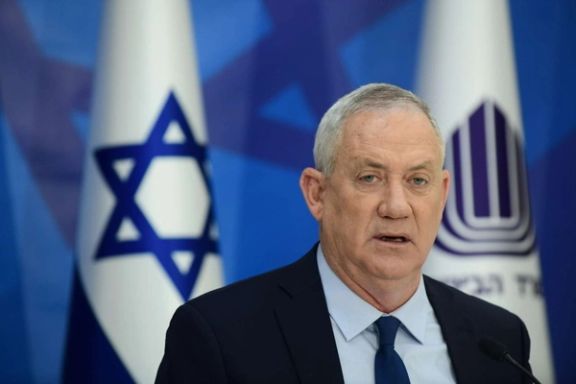
Despite repeated statements from Israeli officials warning of impending Iranian attacks on its citizens visiting Turkey, Tehran has generally remained silent.
Israeli officials and media began issuing the warnings in the end of May and intensified alerts at the beginning of this week. Defense Minister Benny Gantz issued his latest statement on Saturday reiterating that there is a serious risk of attacks on Israelis in Turkey by Iranian networks.
“I call on all Israelis in Turkey to obey the instructions of the security forces,” Gantz said in a statement published by his office Saturday evening, adding, “Israel is working to thwart Iranian attempts to carry out an attack, and is preparing to respond forcefully to any attack on Israeli citizens — anywhere."
But Iranian officials have not directly responded to the serious accusations. Only Tasnim news agency affiliated with the Revolutionary Guard commented that the Israeli warnings to its citizens is “psychological war” against Iran.
Several individuals affiliated with the Revolutionary Guard have been killed or died mysteriously in recent weeks in Iran. These incidents are attributed to a covert war waged by Israel inside Iran. On Sunday, the hardline Resalat newspaper called for a hard response inside Israel to protect Iran’s reputation as a power in the region, but no mention was made of Israeli warnings about attacks in Turkey.
Gantz’s warning came two days after an Israeli media report on June 16 that Turkey bluntly warned Iran not to use its territory for anti-Israeli acts.
So far there have been no incidents, but Israeli officials have been insisting that they are in close cooperation with Turkish security agencies to thwart any Iranian threat.
Although Turkish officials have been generally silent about the threat, but this could be due to the timing of the Israeli warnings coming at the beginning of Turkey’s tourism season. However, Ankara has not denied warnings of an Iranian threat coming from Israeli officials and media.
The silence from Tehran, however, might be more telling. The Islamic Republic finds itself in isolation, after earlier this month the International Atomic Energy Agency’s board of governors representing 35 nations, in a resolution passed with overwhelming majority criticized Tehran for lack of cooperation in an ongoing investigation of its past nuclear activities.
The debate in Iran now is about how to deal with the situation at hand and with a possible threat of more punitive actions by the United States and its European allies on the nuclear issue.
Moreover, Iran’s internal situation is becoming more precarious, with the economy seemingly in chaos and daily anti-government protests continuing since early May.
With strong public frustration over high inflation and government mismanagement, Iran’s leaders know that the people see this from the prism of their confrontational foreign policy. This could be one reason why they prefer not to remind the people of adventures abroad.
It is also possible that they know if they try to deny the Israeli accusations, information about the existence of a real threat might be revealed.
Israel channel 12 on Saturday reported that Israel’s Mossad and Turkish intelligence services had thwarted an attack over the past day, but no details or concrete source was mentioned.
“There are Israelis who were minutes from death and do not know it,” an unnamed defense official told Channel 13 news on Saturday according to Times of Israel. “Another day where we let out a sigh of relief that the attack did not happen.”